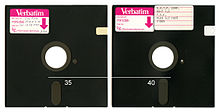| Developer | Technical Systems Consultants |
|---|---|
| Working state | Discontinued |
| Source model | Open source |
| Initial release | 1976 |
| Latest release | 2.0 / October 3, 1985 |
| Available in | English |
| Platforms | Motorola 6800, Motorola 6809 |
| Kernel type | Monolithic |
| Default user interface | Command-line interface |
The FLEX single-tasking operating system was developed by Technical Systems Consultants (TSC) of West Lafayette, Indiana, for the Motorola 6800 in 1976.[1]
Overview
The original version was for 8" floppy disks and the (smaller) version for 5.25" floppies was called mini-Flex. It was also later ported to the Motorola 6809; that version was called Flex9.[2] All versions were text-based and intended for use on display devices ranging from printing terminals like the Teletype Model 33 ASR to smart terminals. While no graphic displays were supported by TSC software, some hardware manufacturers supported elementary graphics and pointing devices.
It was a disk-based operating system, using 256-byte sectors on soft-sectored floppies; the disk structure used linkage bytes in each sector to indicate the next sector in a file or free list. The directory structure was much simplified as a result. TSC (and others) provided several programming languages including BASIC in two flavors (standard and extended) and a tokenizing version of extended BASIC called Pre-compiled BASIC, FORTH, C, FORTRAN, and PASCAL.
TSC also wrote a version of FLEX, Smoke Signal DOS, for the California hardware manufacturer Smoke Signal Broadcasting; this version used forward and back linkage bytes in each sector which increased disk reliability at the expense of compatibility and speed.
Later, TSC introduced the multitasking, multi-user, Unix-like UniFLEX operating system, which required DMA disk controllers, 8" disk, and so sold in only small numbers. Several of the TSC computer languages were ported to UniFLEX.
During the early 1980s, FLEX was offered by Compusense Ltd as an operating system for the 6809-based Dragon 64 home computer.
Commands
The following commands are supported by different versions of the FLEX operating system.[3][4][5]
- APPEND
- ASN
- BACKUP
- BUILD
- CAT
- COPY
- COPYNEW
- C4MAT
- CLEAN
- DATE
- DELETE
- ECHO
- EXEC
- FIX
- GET
- I
- JUMP
- LINK
- LIST
- MEMTEST1
- MON
- N
- NEWDISK
- O
- P
- P.COR
- PO
- PROT
- PSP
- Q
- QCHECK
- READPROM
- RENAME
- RM
- S
- SAVE
- SAVE.LOW
- SBOX
- SP
- STARTUP
- TOUCH
- TTYSET
- UCAL
- USEMF
- VER
- VERIFY
- VERSION
- WRITPROM
- XOUT
- Y
See also
- Microsoft BASIC-68 for FLEX
- Microsoft BASIC-69 for FLEX
References
- ^ History Archived 2010-01-28 at the Wayback Machine, FLEX User Group
- ^ FAQs, FLEX User Group
- ^ FLEX User’s Manual (miniFLEX)
- ^ FLEX 2.0 User's Manual
- ^ FLEX 9.0 User’s Manual
